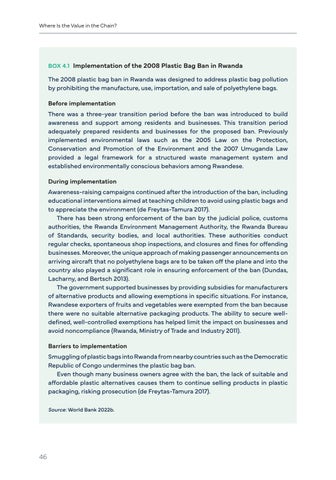Where Is the Value in the Chain?
BOX 4.1 Implementation of the 2008 Plastic Bag Ban in Rwanda
The 2008 plastic bag ban in Rwanda was designed to address plastic bag pollution by prohibiting the manufacture, use, importation, and sale of polyethylene bags. Before implementation There was a three-year transition period before the ban was introduced to build awareness and support among residents and businesses. This transition period adequately prepared residents and businesses for the proposed ban. Previously implemented environmental laws such as the 2005 Law on the Protection, Conservation and Promotion of the Environment and the 2007 Umuganda Law provided a legal framework for a structured waste management system and established environmentally conscious behaviors among Rwandese. During implementation Awareness-raising campaigns continued after the introduction of the ban, including educational interventions aimed at teaching children to avoid using plastic bags and to appreciate the environment (de Freytas-Tamura 2017). There has been strong enforcement of the ban by the judicial police, customs authorities, the Rwanda Environment Management Authority, the Rwanda Bureau of Standards, security bodies, and local authorities. These authorities conduct regular checks, spontaneous shop inspections, and closures and fines for offending businesses. Moreover, the unique approach of making passenger announcements on arriving aircraft that no polyethylene bags are to be taken off the plane and into the country also played a significant role in ensuring enforcement of the ban (Dundas, Lacharny, and Bertsch 2013). The government supported businesses by providing subsidies for manufacturers of alternative products and allowing exemptions in specific situations. For instance, Rwandese exporters of fruits and vegetables were exempted from the ban because there were no suitable alternative packaging products. The ability to secure well- defined, well-controlled exemptions has helped limit the impact on businesses and avoid noncompliance (Rwanda, Ministry of Trade and Industry 2011). Barriers to implementation Smuggling of plastic bags into Rwanda from nearby countries such as the Democratic Republic of Congo undermines the plastic bag ban. Even though many business owners agree with the ban, the lack of suitable and affordable plastic alternatives causes them to continue selling products in plastic packaging, risking prosecution (de Freytas-Tamura 2017). Source: World Bank 2022b.
46





